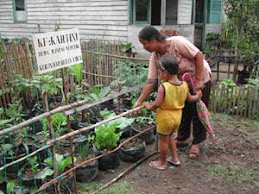By Mike Lang
Soaring fuel prices affect just about everything we do, from travel to grocery bills. This year, I predict that the backyard vegetable garden will be important to even more people than in years past, in an effort to offset some of the grocery tab.
Vegetable gardening can seem like a daunting task to novices and veterans alike when confronted with terms at garden stores that are not part of most people’s everyday vocabulary. To thwart this tough part of gardening, I have compiled a list of the most frequently questioned terms I hear from year to year.
GARDENING VOCABULARY: To produce a better garden crop, gardeners should know some basic gardening terminology.
An allelopathic plant is a plant that produces a chemical during the growth cycle that disrupts the growth of other plants around it. Black walnuts are notorious for wreaking havoc on tomatoes and peppers planted too closely. Other plants that have an allelopathic nature are asparagus and fennel.
Bt (Bacillus thuringiensis) is a naturally occurring bacterium that is used to rid the garden of some insects. It is most effective on foliar-feeding insects. However, applications of Bt are not long-lasting, so it requires repeated applications, preferably in the evening hours for the longest effect before it is degraded by sunlight.
Determinate growth is a term that is important to tomato gardeners. When a variety is listed as having this type of habit, it means that it is most likely a smaller plant that will set and mature the majority of the fruit within one window of time. The “paste” type tomato will generally fall into this growth habit, giving you a large amount of produce ready for use all at once.
Green manure is not fresh animal manure, but it can provide nitrogen to vegetable garden plants. This term refers to green plants, such as ryegrass, that are planted to protect the soil from erosion during the time when the garden is not growing vegetables. These plants are tilled into the soil before planting vegetables to provide nutrients and organic matter.
Heirloom plants are plants that have been around gardens for many years. They are open pollinated (naturally pollinated, not artificially) so that seedlings grown from the fruit will be the same type as the parent. Many gardeners got away from heirloom plants when hybrid plants were introduced for increased yields and disease resistance. Gardeners are now returning to the early varieties of heirloom plants, however, because of the sensational taste and forms many of these plants offer. ‘Brandywine’ tomato is one of the more popular heirloom plants.
Hybrid plants are those plants that are a result of pollination of one plant from another that is genetically different. These crosses often result in a vigorously growing plant that produces an abundance of fruit. Other plants have been hybridized because one parent has superior disease resistance. The seed collected from these plants will not produce the type of plant from which it came from, but rather resemble one of the parents, which may not have the ability to produce decent fruit.
Indeterminate growing plants are plants that will continue growing throughout the season, until a killing frost. Gardeners who want to prolong their tomato-picking season should choose indeterminate growing plants. But remember, since the vines continue to grow, these plants will require a little more room in the garden compared to those with a determinate growth habit.
Insecticidal soap is a safe and effective way to control aphids, whiteflies and spider mites in the garden. This insecticide can be made from household liquid soap, but those often contain perfumes and other additives that can be harmful to plants. Therefore, I prefer using an already-made product that rapidly leaves the garden after taking care of the pest.
Systemic is a term used to describe the mode of action for certain insecticides and herbicides. In both cases, the product is applied to the foliage of the plant, and the plant itself moves the product throughout the system of the plant. This is important for insecticides because if you are dealing with a stem or root-feeding pest, application to the foliage will get to those spots. For herbicides, it is important for tough perennial plants, such as dandelions, because if you only kill the top, the root will grow the plant right back.
Zinc is an important nutrient in the growth of plants. Zinc-deficient vegetable plants will be stunted. This deficiency is actually a common problem in high pH soils and those with little organic matter within them. Using compost in the garden soil can help with this problem, as can foliar feeding with a fertilizer that also includes zinc.
Don’t let the gardening glossary deter you from making a positive mark on the budget this summer. Getting past confusing words is one of the hardest parts of putting your own food on the table.



No comments:
Post a Comment